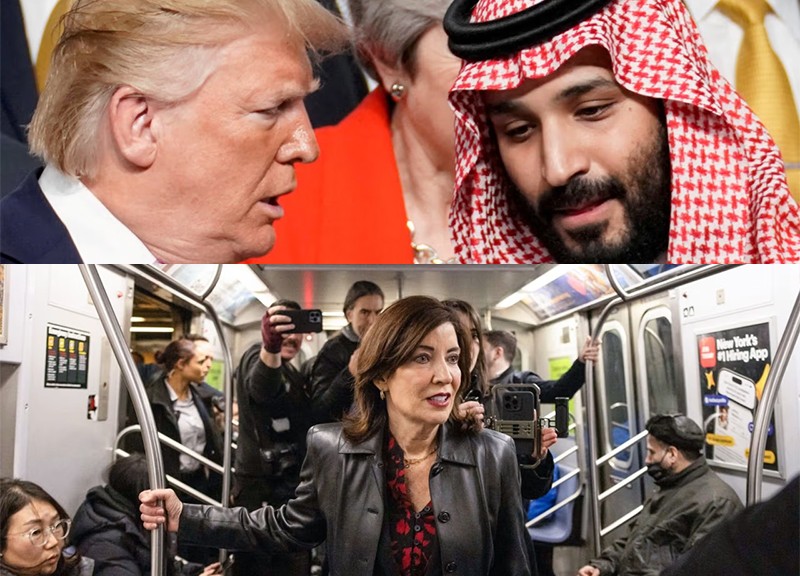
With Trump back in the White House, the crown prince has new opportunities and faces new pressures.
By Karen Elliott House. WSJ.
Crown Prince Mohammed bin Salman prides himself on strong relations with President Trump, but Mr. Trump’s second term is posing serious dilemmas for the young Saudi leader, known as MBS. Mr. Trump wants low oil prices. Saudi Arabia needs high prices to fund its plan to wean the kingdom off oil.
Mr. Trump has resumed his maximum-pressure campaign against Iran, undermining the crown prince’s efforts to reduce tensions with Tehran that could lead the clerical regime to lash out at Saudi Arabia. Most disruptive is Mr. Trump’s proposal to turn Gaza into the “Riviera of the Middle East” by removing 2.2 million Palestinian inhabitants.
The kingdom’s neighborhood is in turmoil. Syria’s new leader is struggling to keep his country from further splintering into warring fiefdoms. Lebanon’s new president similarly seeks to quell Hezbollah terrorists. Israel struggles to free its hostages and eject Hamas terrorists from Gaza. Meantime, Israeli security officials privately insist that now is the time to strike Iran’s nuclear program. U.S. attacks this week on Iran-backed Houthi rebels in Yemen raise the risk that Iran—or the Houthis—may retaliate against Saudi oil targets.
If these external problems aren’t enough, the crown prince faces falling oil prices, rising budget deficits and tepid foreign direct investment at home. This constellation of chaos puts at risk his costly new developments—and the oil wealth that has funded them. Saudi security officials express fear that Israeli strikes on Iran’s nuclear program, even if successful, likely would bring retaliation on Saudi Arabia, not on nucleararmed Israel. While Israel has already destroyed Iran’s air defenses, Tehran still possesses plenty of missiles to fire at the kingdom. In 2019, Iran’s strike on Saudi oil processing facilities at Abqaiq briefly knocked out 50% of Saudi oil exports. The memories of that—and the shocking failure of the first Trump administration to retaliate—remain raw. Distrust of the U.S. has led the crown prince to hedge his big-power bets.
MBS is actively engaged in highwire diplomacy on all these Mideast issues plus Ukraine. He has hosted the presidents of Syria, Lebanon and Ukraine. He helped assemble Arab leaders to try to come up with a Gaza peace plan acceptable to Mr. Trump, who continues to talk, at least vaguely, about dispelling Palestinians from Gaza.
The Saudi leader is positioned to play a constructive role in the region of the if Mr. Trump wants to enhance stability there rather than simply make a splash. He's Mr.Trump’s favorite Arab leader. Moreover, he has relations with China, Russia and even Iran, with which he restored diplomatic ties in 2023, and now seeks to broker talks between Washington and Tehran. Along with Russia’s Vladimir Putin, he has a decisive say over oil production and thus prices that influence the global economy. President Biden’s “pariah” has suddenly become President Trump’s “peacemaker.”
Mr. Trump allowed Saudi Arabia to host U.S. talks with Ukraine and Russia. Moreover, he’s hinting that MBS will host the first face-to-face talks between Messrs. Trump and Putin on a Ukrainian peace deal. All this helps fulfill the crown prince’s determination to position himself and his kingdom as a pivotal global player.
The transactional American president will almost surely expect payback for his promotion of MBS. Already Mr. Trump has said his first foreign trip will be to the kingdom if Riyadh raises its planned investment in the U.S. to $1 trillion from $600 billion. He also has demanded—and received—higher oil production to bring down oil prices and please U.S. consumers.
Still, it’s fair to surmise that Mr. Trump seeks something much greater: a peace prize for securing diplomatic relations between Saudi Arabia and Israel. A commercial connection would benefit both countries, pairing Israeli technology with Saudi money to create needed jobs in the kingdom. You can almost hear Mr. Trump telling MBS, “I helped position you as a peacemaker, so return the favor.”
The crown prince has adamantly insisted that Saudi Arabia won’t recognize Israel unless it permits the creation of an “independent Palestinian state with East Jerusalem as its capital.” After Oct. 7, 2023, Israelis are understandably uninterested in such accommodation, and radical Palestinians want to eliminate Israel, not to coexist as neighbors. Polls in Saudi Arabia show that 90% of Saudis oppose relations with Israel. While MBS surely remembers that Egyptian President Anwar Sadat paid with his life for recognizing Israel, he remains committed to a relationship with Israel for both economic and security reasons.
Rising concern about U.S. reliability only feeds Saudi interest in a partnership with Israel. MBS is as relentlessly wedded to his “Saudi First” policy as Mr. Trump is to his Make America Great Again vision. Those close to the crown prince say he won’t allow decades of corrupt Palestinian leadership and Arab division to stand in the way of his pursuit of Saudi Arabia’s interests. Yet, while normalization of relations with Israel is possible, creation of a Palestinian state isn’t. Therein lies Mohammed bin Salman’s dilemma.
Ms. House is a former publisher of the Journal and author of “The Man Who Would Be King,” forthcoming in July.














